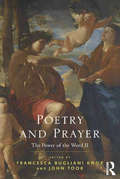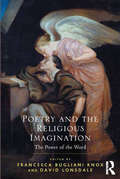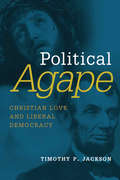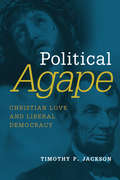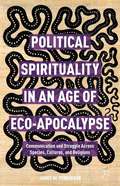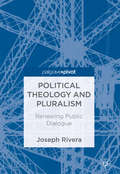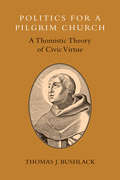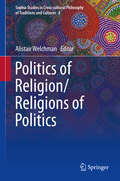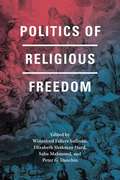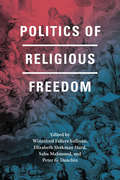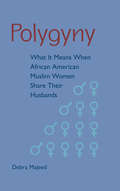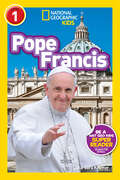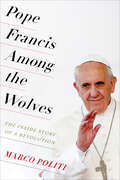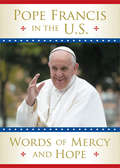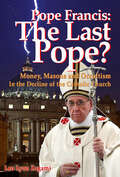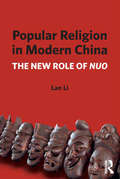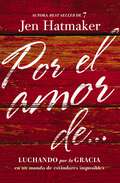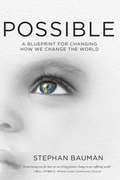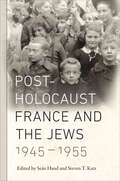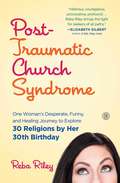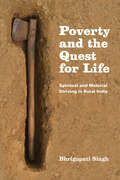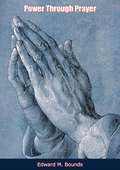- Table View
- List View
Poetry and Prayer: The Power of the Word II (The Power of the Word)
by Francesca Bugliani Knox John TookInterdisciplinary and ecumenical in scope, Poetry and Prayer offers theoretical discussion on the profound connection between poetic inspiration and prayer as well as reflection on the work of individual writers and the traditions within which they stand. An international range of established and new scholars in literary studies and theology offer unique contributions to the neglected study of poetry in relation to prayer. Part I addresses the relationship of prayer and poetry. Parts II and III consider these and related ideas from the point of view of their implementation in a range of different authors and traditions, offering case studies from, for example, the Bible, Dante, Shakespeare and Herbert, as well as twentieth-century poets such as Thomas Merton, Denise Levertov, W.H. Auden and R.S. Thomas.
Poetry and the Religious Imagination: The Power of the Word (The Power of the Word)
by David Lonsdale Francesca Bugliani KnoxWhat is the role of spiritual experience in poetry? What are the marks of a religious imagination? How close can the secular and the religious be brought together? How do poetic imagination and religious beliefs interact? Exploring such questions through the concept of the religious imagination, this book integrates interdisciplinary research in the area of poetry on the one hand, and theology, philosophy and Christian spirituality on the other. Established theologians, philosophers, literary critics and creative writers explain, by way of contemporary and historical examples, the primary role of the religious imagination in the writing as well as in the reading of poetry.
Political Agape: Christian Love and Liberal Democracy (Emory University Studies in Law and Religion)
by Timothy P. JacksonWhat is the place of Christian love in a pluralistic society dedicated to “liberty and justice for all”? What would it mean to take both Jesus Christ and Abraham Lincoln seriously and attempt to translate love of God and neighbor into every quarter of life, including law and politics?Timothy Jackson here argues that agapic love of God and neighbor is the perilously neglected civil virtue of our time -- and that it must be considered even before justice and liberty in structuring political principles and policies. Jackson then explores what “political agape” might look like when applied to such issues as the death penalty, same-sex marriage, and adoption.
Political Agape: Christian Love and Liberal Democracy (Emory University Studies in Law and Religion)
by Timothy P. JacksonWhat is the place of Christian love in a pluralistic society dedicated to “liberty and justice for all”? What would it mean to take both Jesus Christ and Abraham Lincoln seriously and attempt to translate love of God and neighbor into every quarter of life, including law and politics?Timothy Jackson here argues that agapic love of God and neighbor is the perilously neglected civil virtue of our time -- and that it must be considered even before justice and liberty in structuring political principles and policies. Jackson then explores what “political agape” might look like when applied to such issues as the death penalty, same-sex marriage, and adoption.
Political Spirituality in an Age of Eco-Apocalypse
by James W. PerkinsonThis book 'hunts and gathers' across different historical epochs and situations, juxtaposing biblical materials and hip-hop, Christian colonialism and vodou, personal experience and racial politics, poetics and high theory. It is compelled by a desire to challenge the current crisis of sustainability from the point of view of indigenous communities and deep ancestry. Author James W. Perkinson ably synthesizes material from a diverse range of fields, including anarcho-primitivism, biblicalstudies, and history of religions in order to argue for a 'turn to indigeneity. ' The book's motive force is a deep concern for humanity's future in the face of eco-disasters like climate change and population overshoot as well as the compounding problems brought on by political economy calamities. Given the growing trend toward a turn away from institutionalized religious commitment and toward a more generalized and post-modern mix of practices and interests typically styled as 'spiritual,' the work proposes 'political spirituality' as a theme for investigation. Throughout the book, Perkinson raises the question: What does it really meant to be a human being? This query is posed not merely as a philosophical inquiry or existential musing, but as a personal and political conundrum arising from the overwhelming crises now engulfing our global reality. The book constitutes a poetic 'walk about' across quite different historical epochs and disparate contexts. Creatively foraging for indigenous memories and insurgent energies to help us live and cope in our modern state of unsustainability, the work aims to re-animate love of the wild and 'interspecies listening' for the sake of survival. The text articulates a deep suspicion toward our growing fascination with a kind of 'techno-messianism,' while nonetheless exploring some of the artistic innovations and meanings emerging from industrialization and digitalization.
Political Theology and Pluralism: Renewing Public Dialogue
by Joseph RiveraReviving the ancient political wisdom of St. Augustine in combination with insights drawn from contemporary political theorist John Rawls, Joseph Rivera grapples with the polarizing nature of religion in the public square. Political theology, as a discipline, tends to argue that communitarianism remains the only viable political option for religious practitioners in a complex, pluralist society. Unsurprisingly, we are increasingly accustomed to think the religious voice is anti-secular and illiberal. On the contrary, Christian theology and political liberalism, Rivera argues, are not incompatible. Political Theology and Pluralism challenges the longstanding antithesis between theology and political liberalism by asking his readers to focus not on difference, but on our common humanity. Outlining real strategies for public dialogue in a liberal state, Rivera offers the opportunity to discover what it means to practice civic friendship in pluralist context.
Politics and the Sacred
by Harald WydraThis path-breaking book argues that practices of the sacred are constitutive of modern secular politics. Following a tradition of enquiry in anthropology and political theory, it examines how limit situations shape the political imagination and collective identity. As an experiential and cultural fact, the sacred emerges within, and simultaneously transcends, transgressive dynamics such as revolutions, wars or globalisation. Rather than conceive the sacred as a religious doctrine or a metaphysical belief, Wydra examines its adaptive functions as origins, truths and order which are historically contingent across time and transformative of political aspirations. He suggests that the brokenness of political reality is a permanent condition of humanity, which will continue to produce quests for the sacred, and transcendental political frames. Working in the spirit of the genealogical mode of enquiry, this book examines the secular sources of political theologies, the democratic sacred, the communist imagination, European political identity, the sources of human rights and the relationship of victimhood to new wars.
Politics for a Pilgrim Church: A Thomistic Theory of Civic Virtue
by Thomas J. BushlackPresents an innovative, constructive alternative to Christian involvement in the "culture wars" Church leaders and scholars have long wrestled with what should provide a guiding vision for Christian engagement in culture and politics. In this book Thomas Bushlack argues that a retrieval of Thomas Aquinas's understanding of civic virtue provides important resources for guiding this engagement today. Bushlack suggests that Aquinas's vision of the pilgrim church provides a fitting model for seeking the earthly common good of the political community, and he notes the features of a Thomistic account of justice and civic virtue that remain particularly salient for the twenty-first century. The book concludes with suggestions for cultivating a Christian rhetoric of the common good as an alternative to the predominant forms of discourse fostered within the culture wars that have been so divisive.
Politics for a Pilgrim Church: A Thomistic Theory of Civic Virtue
by Thomas J. BushlackPresents an innovative, constructive alternative to Christian involvement in the "culture wars" Church leaders and scholars have long wrestled with what should provide a guiding vision for Christian engagement in culture and politics. In this book Thomas Bushlack argues that a retrieval of Thomas Aquinas's understanding of civic virtue provides important resources for guiding this engagement today. Bushlack suggests that Aquinas's vision of the pilgrim church provides a fitting model for seeking the earthly common good of the political community, and he notes the features of a Thomistic account of justice and civic virtue that remain particularly salient for the twenty-first century. The book concludes with suggestions for cultivating a Christian rhetoric of the common good as an alternative to the predominant forms of discourse fostered within the culture wars that have been so divisive.
Politics of Religion/Religions of Politics
by Alistair WelchmanThe liberal enlightenment as well as the more radical left have both traditionally opposed religion as a reactionary force in politics, a view culminating in an identification of the politics of religion as fundamentalist theocracy. But recently a number of thinkers--Agamben, Badiou, Tabues and in particular Simon Critchley--have begun to explore a more productive engagement of the religious and the political in which religion features as a possible or even necessary form of human emancipation. The papers in this collection, deriving from a workshop held on and with Simon Critchley at the University of Texas at San Antonio in February 2010, take up the ways in which religion's encounter with politics transforms not only politics but also religion itself, molding it into various religions of politics, including not just heretical religious metaphysics, but also what Critchley describes as non-metaphysical religion, the faith of the faithless. Starting from Critchley's own genealogy of Pauline faith, the articles in this collection explore and defend some of the religions of politics and their implications. Costica Bradatan teases out the implications of Critchley's substitution of humor for tragedy as the vehicle for the minimal self-distancing required for any politics. Jill Stauffer compares Critchley's non-metaphysical religiosity with Charles Taylor's account of Christianity. Alistair Welchman unpacks the political theology of the border in terms of god's timeless act of creation. Anne O'Byrne explores the subtle dialectic between mores and morality in Rousseau's political ethics. Roland Champagne sees a kind non-metaphysical religion in Arendt's category of the political pariah. Davide Panagia presents Critchley's ethics of exposure as the basis for a non-metaphysical political bond. Philip Quadrio wonders about the political ramifications of Critchley's own 'mystical anarchism' and Tina Chanter re-reads the primal site in the Western tradition at which the political and the religious intersect, the Antigone story, side-stepping philosophical interpretations of the story (dominated by Hegel's reading) by means of a series of post-colonial re-imaginings of the play. The collection concludes with an interview with Simon Critchley taking up the themes of the workshop in the light of more recent political events: the Arab Spring and the rise and fall of the Occupy movement.
Politics of Religious Freedom
by Saba Mahmood Elizabeth Shakman Hurd Peter G. Danchin Winnifred Fallers SullivanIn a remarkably short period of time, the realization of religious freedom has achieved broad consensus as an indispensable condition for peace. Faced with widespread reports of religious persecution, public and private actors around the world have responded with laws and policies designed to promote freedom of religion. But what precisely is being promoted? What are the cultural and epistemological assumptions underlying this response, and what forms of politics are enabled in the process? The fruits of the three-year Politics of Religious Freedom research project, the contributions to this volume unsettle the assumption--ubiquitous in policy circles--that religious freedom is a singular achievement, an easily understood state of affairs, and that the problem lies in its incomplete accomplishment. Taking a global perspective, the more than two dozen contributors delineate the different conceptions of religious freedom predominant in the world today, as well as their histories and social and political contexts. Together, the contributions make clear that the reasons for persecution are more varied and complex than is widely acknowledged, and that the indiscriminate promotion of a single legal and cultural tool meant to address conflict across a wide variety of cultures can have the perverse effect of exacerbating the problems that plague the communities cited as falling short.
Politics of Religious Freedom (South Atlantic Quarterly Ser. #Vol. 113)
by Saba Mahmood Elizabeth Shakman Hurd Peter G. Danchin Winnifred Fallers Sullivan, Elizabeth Shakman Hurd, Saba Mahmood, and Peter G. DanchinIn a remarkably short period of time, the realization of religious freedom has achieved broad consensus as an indispensable condition for peace. Faced with widespread reports of religious persecution, public and private actors around the world have responded with laws and policies designed to promote freedom of religion. But what precisely is being promoted? What are the cultural and epistemological assumptions underlying this response, and what forms of politics are enabled in the process? The fruits of the three-year Politics of Religious Freedom research project, the contributions to this volume unsettle the assumption—ubiquitous in policy circles—that religious freedom is a singular achievement, an easily understood state of affairs, and that the problem lies in its incomplete accomplishment. Taking a global perspective, the more than two dozen contributors delineate the different conceptions of religious freedom predominant in the world today, as well as their histories and social and political contexts. Together, the contributions make clear that the reasons for persecution are more varied and complex than is widely acknowledged, and that the indiscriminate promotion of a single legal and cultural tool meant to address conflict across a wide variety of cultures can have the perverse effect of exacerbating the problems that plague the communities cited as falling short.
Polygyny: What It Means When African American Muslim Women Share Their Husbands
by Majeed Majeed"Captivating, provocative, and groundbreaking. Taking up the mandate that women's realities matter, Majeed writes with depth and analytical rigor about a topic we have scarcely begun to understand."--Amina Wadud, author of Inside The Gender Jihad "Tackles the contours and intimacies of a much practiced but seldom spoken about quasi-marriage that leaves women without legal support. A much-needed text on an extremely sensitive topic. Majeed excavates this terrain with finesse and a deft scholarly hand."--Aminah Beverly McCloud, coeditor of An Introduction to Islam in the 21st Century "Utilizes ethnographic research methods to imaginatively and constructively complexify the reality of polygyny in the lives of African American Muslim women."--Linda Elaine Thomas, author of Under the Canopy "Majeed's womanist approach is critical, yet balanced enough to include the concerns of women, men, and children, affording readers a broad and vital gaze into the lives of these unconventional households."--Zain Abdullah, author of Black Mecca "A powerful and long overdue study of polygyny in African American Muslim communities."--Shabana Mir, author of Muslim American Women on Campus Debra Majeed sheds light on families whose form and function conflict with U.S. civil law. Polygyny--multiple-wife marriage--has steadily emerged as an alternative to the low numbers of marriageable African American men and the high number of female-led households in black America. This book features the voices of women who welcome polygyny, oppose it, acquiesce to it, or even negotiate power in its practices. Majeed examines the choices available to African American Muslim women who are considering polygyny or who are living it. She calls attention to the ways in which interpretations of Islam's primary sources are authorized or legitimated to regulate the rights of Muslim women. Highlighting the legal, emotional, and communal implications of polygyny, Majeed encourages Muslim communities to develop formal measures that ensure the welfare of women and children who are otherwise not recognized by the state. Debra Majeed is professor of religious studies at Beloit College.
Pope Francis (Readers Bios)
by Barbara KramerMeet Pope Francis. Born Jorge Mario Bergoglio in Buenos Aires, Argentina, Pope Francis is the first Pope from the Americas. He's also the first Pope to replace a living one! Learn all about the Pontiff in this level 1 reader, carefully leveled for an early independent reading or read aloud experience.
Pope Francis Among the Wolves: The Inside Story of a Revolution
by Marco PolitiMarco Politi takes us deep inside the power struggle roiling the Roman Curia and the Catholic Church worldwide, beginning with Benedict XVI, the pope who famously resigned in 2013, and intensifying with the contested and unexpected election of Jorge Mario Bergoglio, archbishop of Buenos Aires, now known as Pope Francis. Politi's account balances the perspectives of Pope Francis's supporters, Benedict's sympathizers, and those disappointed members of the Catholic laity who feel alienated by the institution's secrecy, financial corruption, and refusal to modernize.Politi dramatically recounts the sexual scandals that have rocked the church and the accusations of money laundering and other financial misdeeds swirling around the Vatican and the Italian Catholic establishment. Pope Francis has tried to shine a light on these crimes, but his work has been met with resistance from entrenched factions. Politi writes of the decline in church attendance and vocations to the priesthood throughout the world as the church continues to prohibit divorced and remarried Catholics from receiving the communion wafer. He visits European parishes where women now perform the functions of missing male priests—and where the remaining parishioners would welcome the admission of women to the priesthood, if the church would allow it. Pope Francis's emphasis on pastoral compassion for all who struggle with the burden of family life has also provoked the ire of traditionalists in the Roman Curia and elsewhere. He knows from personal experience what life is like for the poor in Buenos Aires and other metropolises of the globalized world, and highlights the contrast between the vital, vibrant faith of these parishioners and the disillusionment of European Catholics. Pope Francis and his supporters are locked in a battle with the defenders of the traditional hard line and with ecclesiastical corruption. In this conflict, the future of Catholicism is at stake—and it is far from certain Francis will succeed in saving the institution from decline.
Pope Francis Among the Wolves: The Inside Story of a Revolution
by Marco PolitiA behind-the-scenes view of the power struggles within the Vatican and &“a look inside the byzantine halls of the institutional Catholic Church.&”—Publishers Weekly A journalist who has long covered the Vatican, Marco Politi takes us deep inside the struggle roiling the Roman Curia and the Catholic Church worldwide, beginning with Benedict XVI, the pope who famously resigned in 2013, and intensifying with the unexpected election of Jorge Mario Bergoglio, archbishop of Buenos Aires, now known as Pope Francis. Politi&’s account balances the perspectives of Pope Francis&’s supporters, Benedict&’s sympathizers, and those disappointed members of the laity who feel alienated by the institution&’s secrecy, financial corruption, and refusal to modernize. Politi dramatically recounts the sexual scandals that have rocked the church and the accusations of money laundering and other financial misdeeds swirling around the Vatican and the Italian Catholic establishment, and how Pope Francis&’s attempts to address these crimes has been met with resistance from entrenched factions. He writes of the decline in church attendance and vocations to the priesthood as the church continues to prohibit divorced and remarried Catholics from receiving Communion. He visits European parishes where women perform the functions of missing male priests—and where the remaining parishioners would welcome the ordination of women, if the church would allow it. Pope Francis&’s emphasis on pastoral compassion for all who struggle with the burden of family life has also provoked the ire of traditionalists. He knows from experience what life is like for the poor in South America and elsewhere, and highlights the contrast between the vital, vibrant faith of these parishioners and the disillusionment of European Catholics. As Pope Francis and his supporters are locked in battle with the defenders of the traditional hard line and with ecclesiastical corruption, the future of Catholicism is at stake—and it is far from certain Francis will succeed in saving the institution from decline.
Pope Francis in the U.S.
by Marianne Lorraine Trouvé FSPSavor the most soul-stirring aspects of Pope Francis' historic visit to the U.S. with this prayerfully crafted collection. Arranged by topic, these excerpts from Pope Francis' talks will help you reflect on his words and be moved to do what you can to make the Gospel and the works of mercy a strong force in your own daily life. Allow this beloved Pope to continue to speak to you and to those you love!
Pope Francis: Money, Masons and Occultism in the Decline of the Catholic Church
by Brad Olsen Leo ZagamiPope Francis: The Last Pope? reveals the possible reasons for the choice of historical abdication of Benedict XVI and traces the process that led to the election of Cardinal Bergoglio: the Pope who many have prophesized will be the last and will bring the Catholic Church to its end. The book details the history of this prophecy, which was hidden away in the Vatican for hundreds of years and predicts that the reign of the last Pope will herald the beginning of "great apostasy" followed by "great tribulation." It also explores the recent scandals in the Catholic Church and addresses questions including What pressures decreed the end of the pontificate of Benedict XVI? What powers have an interest for the Church to end? and What is the relationship between the Vatican and the New World Order? Perfect for anyone interested in prophecies about the end times, Pope Francis: The Last Pope reveals the truth about what numerology says about the last Pope and the darkness that may follow him, as well as fascinating investigations into the gay lobby, Freemasonry, and the Jesuit agenda in the Vatican and how it relates to the first Borgia Pope, the legend of the White Pope and the Black Pope, and how Benedict's resignation may fulfill an ancient prophecy.
Popular Religion in Modern China: The New Role of Nuo
by Lan LiSince the early 1980s, China's rapid economic growth and social transformation have greatly altered the role of popular religion in the country. This book makes a new contribution to the research on the phenomenon by examining the role which popular religion has played in modern Chinese politics. Popular Religion in Modern China uses Nuo as an example of how a popular religion has been directly incorporated into the Chinese Community Party's (CCP) policies and how the religion functions as a tool to maintain socio-political stability, safeguard national unification and raise the country's cultural 'soft power' in the eyes of the world. It provides rich new material on the interplay between contemporary Chinese politics, popular religion and economic development in a rapidly changing society.
Por el amor de…: Luchando por la gracia en un mundo de estándares imposibles
by Jen HatmakerLa popular escritora, blogger, y personalidad de televisión revela con humor y estilo de cómo la gracia de Jesús es la clave para lidiar con el mayor reto en la vida: la gente. La mayoría de nuestras alegrías, luchas, emociones y angustias vienen de relacionarse con la gente, comenzando primero con nosotros mismos y luego la gente que conocemos, al casarnos, al nacer, al vivir, en la iglesia, con la actitud de no me gusta, no entiendo, el miedo, las luchas, las comparaciones y las criticas. Las personas pueden ser lo mejor y lo peor de la vida. Jen Hatmaker sabe esto muy bien, y por eso revela cómo practicar la bondad, la gracia, la veracidad, la visión y el amor a nosotros mismos y a los que nos rodean. De esta manera, "Por el Amor" conduce a nuestra generación a re-imaginar la gracia de Jesús como una forma de vida, y lo hace de una manera divertida pero profunda que a los lectores cristianos les encantará. The popular writer, blogger, and television personality reveals with humor and style how Jesus' embarrassing grace is the key to dealing with life's biggest challenge: people.
Possible: A Blueprint for Changing How We Change the World
by Stephan BaumanWe need a better vision for saving the world. Across the world, people like you are rising up to fight poverty, oppression, and injustice--not just professionals, but bloggers, musicians, entrepreneurs, artists, homemakers, and advocates. People who refuse to accept the world as it is, who dare to believe change is possible. But we face a crisis of vision. We sense what needs to be done, but often we don't know how to do it. Without a better blueprint for doing good well, our moment in history will slip away. Stephan Bauman, president of a leading charity believes true change begins in the hearts and actions of ordinary people. In Possible, he presents clear and biblical thinking, powerful stories, and practical tools for sustainably impacting our workplaces, neighborhoods, villages, and cities. Possible is an eloquent and personal call to reconsider what it means to change ourselves so that we can change the world.From the Hardcover edition.
Post-Holocaust France and the Jews, 1945-1955 (Elie Wiesel Center for Judaic Studies Series #2)
by Seán Hand Steven T KatzDespite an outpouring of scholarship on the Holocaust, little work has focused on what happened to Europe’s Jewish communities after the war ended. And unlike many other European nations in which the majority of the Jewish population perished, France had a significant post‑war Jewish community that numbered in the hundreds of thousands. Post-Holocaust France and the Jews, 1945–1955 offers new insight on key aspects of French Jewish life in the decades following the end of World War II.How Jews had been treated during the war continued to influence both Jewish and non-Jewish society in the post-war years. The volume examines the ways in which moral and political issues of responsibility combined with the urgent problems and practicalities of restoration, and it illustrates how national imperatives, international dynamics, and a changed self-perception all profoundly helped to shape the fortunes of postwar French Judaism.Comprehensive and informed, this volume offers a rich variety of perspectives on Jewish studies, modern and contemporary history, literary and cultural analysis, philosophy, sociology, and theology.With contributions from leading scholars, including Edward Kaplan, Susan Rubin Suleiman, and Jay Winter, the book establishes multiple connections between such different areas of concern as the running of orphanages, the establishment of new social and political organisations, the restoration of teaching and religious facilities, and the development of intellectual responses to the Holocaust. Comprehensive and informed, this volume will be invaluable to readers working in Jewish studies, modern and contemporary history, literary and cultural analysis, philosophy, sociology, and theology.
Post-Traumatic Church Syndrome: One Woman's Desperate, Funny, and Healing Journey to Explore 30 Religions by Her 30th Birthday
by Reba RileyWritten with humor and personality, this debut memoir recounts a woman’s spiritual quest of experiencing thirty religions before her thirtieth birthday. Post-Traumatic Church Syndrome is for questioners, doubters, misfits, and seekers of all faiths, and tackles the universal struggle to heal what life has broken.On her twenty-ninth birthday, while guests were arriving downstairs, Reba Riley was supposedly upstairs getting dressed. In actuality, she was slumped on the floor sobbing about everything from the meaning of life to the pile of dirty laundry on the floor. Life without God was crashing in on her. And she was sick and tired of feeling sick and tired. She uttered a desperate prayer, and then the idea came to her—thirty by thirty. And thus she embarked on a year-long quest to experience thirty religions by her thirtieth birthday. During her spiritual sojourn, Riley: -Was interrogated about her sex life by Amish grandmothers -Disco danced in a Buddhist temple -Fasted for thirty days without food—or wine -Washed her lady parts in a mosque bathroom -Was audited by Scientologists -Learned to meditate with an urban monk -Snuck into a Yom Kippur service with a fake grandpa in tow -And finally discovered she didn’t have to choose a religion to choose God In a debut memoir that is funny and earnest, Riley invites questioners, doubters, misfits, and curious believers to participate in the universal search to heal what life has broken. Post-Traumatic Church Syndrome takes you by the hand and reminds you that sometimes you first have to be lost in order to be found.
Poverty and the Quest for Life: Spiritual and Material Striving in Rural India
by Bhrigupati SinghThe Indian subdistrict of Shahabad, located in the dwindling forests of the southeastern tip of Rajasthan, is an area of extreme poverty. Beset by droughts and food shortages in recent years, it is the home of the Sahariyas, former bonded laborers, officially classified as Rajasthan’s only “primitive tribe.” From afar, we might consider this the bleakest of the bleak, but in Poverty and the Quest for Life, Bhrigupati Singh asks us to reconsider just what quality of life means. He shows how the Sahariyas conceive of aspiration, advancement, and vitality in both material and spiritual terms, and how such bridging can engender new possibilities of life. Singh organizes his study around two themes: power and ethics, through which he explores a complex terrain of material and spiritual forces. Authority remains contested, whether in divine or human forms; the state is both despised and desired; high and low castes negotiate new ways of living together, in conflict but also cooperation; new gods move across rival social groups; animals and plants leave their tracks on human subjectivity and religiosity; and the potential for vitality persists even as natural resources steadily disappear. Studying this milieu, Singh offers new ways of thinking beyond the religion-secularism and nature-culture dichotomies, juxtaposing questions about quality of life with political theologies of sovereignty, neighborliness, and ethics, in the process painting a rich portrait of perseverance and fragility in contemporary rural India.
Power Through Prayer (Lumen Classics Ser.)
by Edward M. BoundsPower Through Prayer is one of EM Bounds many classic works on prayer. He is practical yet spiritual, challenging us to seek God in passionate and unrelenting prayer.Christ did not come for the righteous but for the sinner and He calls us to pray like he did to the Father in a continual basis. Bounds in this work outlines what kind of heaven and earth shattering effects prayer can have from the individual person to the very ministry that someone may be trying to perform. There is no limit or bounds to what kind of power to faith prayer can have.
